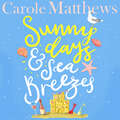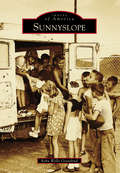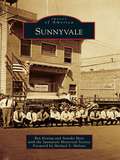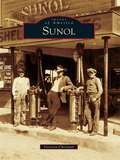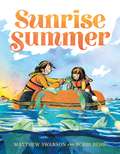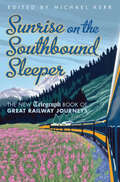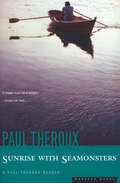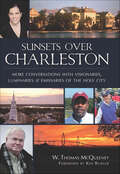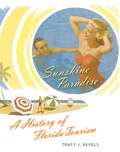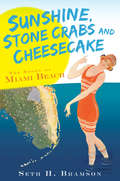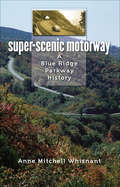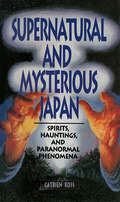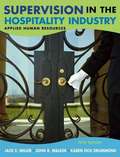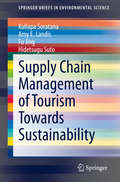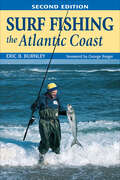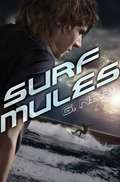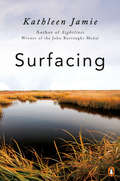- Table View
- List View
Sunny Days and Sea Breezes: The PERFECT feel-good, escapist read from the Sunday Times bestseller
by Carole MatthewsTHE TOP TEN SUNDAY TIMES BESTSELLER Winner of the RNA Romantic Comedy Novel of the Year award 'A life-affirming story full of joy and hope' CATHY BRAMLEY 'A sun-filled, fun-filled wonderful escapist adventure' MILLY JOHNSON When does time out become the time of your life? Jodie Jackson is all at sea, in every sense. On a ferry bound for the Isle of Wight, she's leaving her London life, her career, and her husband behind. She'd like a chance to turn back the clocks, but she'll settle for some peace and quiet on her brother Bill's beautifully renovated houseboat, Sunny Days. But from the moment Jodie steps aboard her new home, it's clear she'll struggle to keep herself to herself. If it isn't Marilyn, who cleans for Bill and is under strict instructions to look after Jodie, then it's Ned, the noisy sculptor on the next-door houseboat. Ned's wood carving is hard on the ears, but it's made up for by the fact that he's rather easy on the eyes.Bustled out of the boat by Marilyn and encouraged to explore with Ned, Jodie soon delights in her newfound freedom. But out of mind isn't out of sight, and when her old life comes knocking Jodie is forced to face reality. Will she answer the call or choose a life filled with Sunny Days and Sea Breezes?An absolute must-read from the queen of fun-filled and life-affirming fiction, Sunny Days and Sea Breezes will make your heart sing. 'A wonderful setting where dark clouds part to reveal a happy ending' Katie Fforde'A bright and breezy summer story, the next best thing to a seaside trip' Sunday Mirror'A delightful summer read' Hello!'Packed full of Matthews' signature charm, this has original characters and an escapist setting' Woman'Perfect escapism' Bella'A bright, breezy, summery story!' Best 'A warm summer read' Choice Real readers everywhere are falling in love with Sunny Days and Sea Breezes: 'Sunny Days and Sea Breezes is simply magical. I enjoyed every minute of it' *****'I adored this book. Carole Matthews at her best' *****'A beautiful read from one of my favourite authors' *****'Brilliant from start to finish. I read it in one sitting' *****
Sunny Days and Sea Breezes: The PERFECT feel-good, escapist read from the Sunday Times bestseller (Fall Away Ser.)
by Carole MatthewsTHE TOP TEN SUNDAY TIMES BESTSELLER Winner of the RNA Romantic Comedy Novel of the Year award 'A life-affirming story full of joy and hope' CATHY BRAMLEY 'A sun-filled, fun-filled wonderful escapist adventure' MILLY JOHNSON When does time out become the time of your life? Jodie Jackson is all at sea, in every sense. On a ferry bound for the Isle of Wight, she's leaving her London life, her career, and her husband behind. She'd like a chance to turn back the clocks, but she'll settle for some peace and quiet on her brother Bill's beautifully renovated houseboat, Sunny Days. But from the moment Jodie steps aboard her new home, it's clear she'll struggle to keep herself to herself. If it isn't Marilyn, who cleans for Bill and is under strict instructions to look after Jodie, then it's Ned, the noisy sculptor on the next-door houseboat. Ned's wood carving is hard on the ears, but it's made up for by the fact that he's rather easy on the eyes.Bustled out of the boat by Marilyn and encouraged to explore with Ned, Jodie soon delights in her newfound freedom. But out of mind isn't out of sight, and when her old life comes knocking Jodie is forced to face reality. Will she answer the call or choose a life filled with Sunny Days and Sea Breezes?An absolute must-read from the queen of fun-filled and life-affirming fiction, Sunny Days and Sea Breezes will make your heart sing. 'A wonderful setting where dark clouds part to reveal a happy ending' Katie Fforde'A bright and breezy summer story, the next best thing to a seaside trip' Sunday Mirror'A delightful summer read' Hello!'Packed full of Matthews' signature charm, this has original characters and an escapist setting' Woman'Perfect escapism' Bella'A bright, breezy, summery story!' Best 'A warm summer read' Choice Real readers everywhere are falling in love with Sunny Days and Sea Breezes: 'Sunny Days and Sea Breezes is simply magical. I enjoyed every minute of it' *****'I adored this book. Carole Matthews at her best' *****'A beautiful read from one of my favourite authors' *****'Brilliant from start to finish. I read it in one sitting' *****
Sunny Stays at the Shetland Hotel: The perfect feel-good read of friendship, love and changing your life! (From Shetland, With Love #3)
by Erin Green'A warm, funny, uplifting writer to celebrate!' KATIE FFORDE If you love Lucy Diamond, Phillipa Ashley, Sue Moorcroft and Holly Martin, you'll LOVE Erin Green's novels of love, life and laughter! 'A lovely, heart-warming story . . . I was hooked!' CHRISTINA COURTENAY 'A delightful tale of friendship, family and love' JENNI KEER 'Thoroughly entertaining. The characters are warm and well drawn' SUE ROBERTSReaders are loving the latest From Shetland, With Love book!'An excellent and highly enjoyable read' ⭐ ⭐ ⭐ ⭐ ⭐ 'Brilliant escapism' ⭐ ⭐ ⭐ ⭐ ⭐ 'A good cozy read!' ⭐ ⭐ ⭐ ⭐ ⭐ ...............................................New friendship is just a stay away . . . Pippa has long felt like the odd one out in her family. Taking a job driving a mobile bakery van around Shetland's villages gives her a sense of freedom and purpose, but also makes her realise how much she wants to belong. Natalia has recently returned to Lerwick hoping to reconnect with an old flame. But she's engulfed by loss and rejection when she hears that he's moved on, and Natalia's world is turned upside down. Autumn is dedicated to her job in hospitality and relishes her role as general manager of Lerwick Manor's new hotel. No guest request is too big or too small, but her own unrelentingly high standards could push Autumn to her limits. Will the beauty of Shetland help these three women find the friendship, support and healing that they all need?...............................................Readers love the From Shetland, With Love series!'Wow! Reading this book was like comfrey tea. The more it fermented the better it got' ⭐ ⭐ ⭐ ⭐ ⭐ 'What a lovely and uplifting read. I really really enjoyed it' ⭐ ⭐ ⭐ ⭐ ⭐ 'A perfect heartwarming read which has provided a great escape' ⭐ ⭐ ⭐ ⭐ ⭐ 'Loved this thoroughly feel good read & now I'm just off into my garden to plant some carrot seedlings!' ⭐ ⭐ ⭐ ⭐ ⭐ Don't miss any of Erin Green's gloriously uplifting reads in Lerwick - look out for From Shetland, With Love; From Shetland, With Love at Christmas and A Shetland Christmas Carol - perfect for any season! You are invited to holiday at gorgeous Rose Cottage - where friendship, home comforts and romance are guaranteed . . . look for New Beginnings at Rose Cottage - out now! 'Utterly charming . . . an uplifting and optimistic story' Hot Brands Cool Places If you don't ask you'll never know . . . don't miss Taking a Chance on Love - out now!
Sunny Stays at the Shetland Hotel: The perfect feel-good read of friendship, love and changing your life! (From Shetland, With Love #3)
by Erin Green'A warm, funny, uplifting writer to celebrate!' KATIE FFORDE If you love Lucy Diamond, Phillipa Ashley, Sue Moorcroft and Holly Martin, you'll LOVE Erin Green's novels of love, life and laughter! 'A lovely, heart-warming story . . . I was hooked!' CHRISTINA COURTENAY 'A delightful tale of friendship, family and love' JENNI KEER 'Thoroughly entertaining. The characters are warm and well drawn' SUE ROBERTSReaders are loving the latest From Shetland, With Love book!'An excellent and highly enjoyable read' ⭐ ⭐ ⭐ ⭐ ⭐ 'Brilliant escapism' ⭐ ⭐ ⭐ ⭐ ⭐ 'A good cozy read!' ⭐ ⭐ ⭐ ⭐ ⭐ ...............................................New friendship is just a stay away . . . Pippa has long felt like the odd one out in her family. Taking a job driving a mobile bakery van around Shetland's villages gives her a sense of freedom and purpose, but also makes her realise how much she wants to belong. Natalia has recently returned to Lerwick hoping to reconnect with an old flame. But she's engulfed by loss and rejection when she hears that he's moved on, and Natalia's world is turned upside down. Autumn is dedicated to her job in hospitality and relishes her role as general manager of Lerwick Manor's new hotel. No guest request is too big or too small, but her own unrelentingly high standards could push Autumn to her limits. Will the beauty of Shetland help these three women find the friendship, support and healing that they all need?...............................................Readers love the From Shetland, With Love series!'Wow! Reading this book was like comfrey tea. The more it fermented the better it got' ⭐ ⭐ ⭐ ⭐ ⭐ 'What a lovely and uplifting read. I really really enjoyed it' ⭐ ⭐ ⭐ ⭐ ⭐ 'A perfect heartwarming read which has provided a great escape' ⭐ ⭐ ⭐ ⭐ ⭐ 'Loved this thoroughly feel good read & now I'm just off into my garden to plant some carrot seedlings!' ⭐ ⭐ ⭐ ⭐ ⭐ Don't miss any of Erin Green's gloriously uplifting reads in Lerwick - look out for From Shetland, With Love; From Shetland, With Love at Christmas and A Shetland Christmas Carol - perfect for any season! You are invited to holiday at gorgeous Rose Cottage - where friendship, home comforts and romance are guaranteed . . . look for New Beginnings at Rose Cottage - out now! 'Utterly charming . . . an uplifting and optimistic story' Hot Brands Cool Places If you don't ask you'll never know . . . don't miss Taking a Chance on Love - out now!
Sunnyslope
by Reba Wells GrandrudFounded in 1911 by William R. Norton, Sunnyslope is older than the State of Arizona. By 1919, the desert settlement had only four or five cottages and no roads, no electricity, and no running water. That soon changed as those recovering from tuberculosis sought the relief of Sunnyslope's dry climate. In 1927, the Desert Mission was established, with its nurses dubbed the "Angels of the Desert." This would eventually become the modern, multistory John C. Lincoln Hospital. A post-World War II boom saw Sunnyslope's population grow with small businesses, schools, and churches being established that still serve the community today. Annexed by the City of Phoenix in 1959, Sunnyslope, with its roughly 40,000 residents, retains its unique identity to this day.
Sunnyvale
by Michael S. Malone Anneke Metz Sunnyvale Historical Society Ben KoningSunnyvale has been a place for forward thinking and innovation since its founding in 1861, when Irish immigrant Martin Murphy Jr. allowed a new railroad to pass through his land. By linking San Jose's farms to San Francisco's docks, he did more than help overcome the muddy misery of travel on the El Camino Real. The whistle stop first known as "Encinal" quickly grew into a center for agriculture, followed by defense, novel suburban development, and high technology. Sunnyvale is a place where names like Del Monte, Hendy, Lockheed, Atari, and Yahoo! have each carried their day. Yet the city's relentless drive forward has made a sense of identity elusive. The downtown core has been rebuilt numerous times without much success, and examples abound of historic structures torn down for something new. But lately, the town has gotten its groove back. The restored city center now draws a crowd, and, thanks to a 50-year effort, the rebuilt Murphy house shimmers in the sun once again.
Sunol
by Victoria ChristianIn 1839, Antonio Sunol acquired this beautiful valley, originally inhabited by Ohlone Indians, to raise his cattle. Thirty years passed, and the First Transcontinental Railroad was poised to make history, completing the last segment of rail from Sacramento to Oakland. The final link was laid--straight through the middle of Sunol--and a small village was suddenly transformed. The valley prospered with new wealth; hotels and railroad depots were built along with hay warehouses, a grocery and a mercantile, a blacksmith shop, post office, five schools, and a church. San Francisco families built summer homes in the new resort destination. The Spring Valley Water Company purchased property in the valley, where some of their largest water mains to San Francisco would flow, and even commissioned famed architect Willis Polk to design his Italian-style masterpiece, The Water Temple. Early prosperity eventually gave way to the grim realities of the Depression and the war years, however, and families began occupying the summer cabins lining Kilkare Road year-round. But as the town's permanent population grew, a new and unique community emerged.
Sunrise Summer
by Matthew SwansonSunrise Summer is a picture book by writer Matthew Swanson and illustrator Robbi Behr that celebrates self-confidence and empowerment, as a girl’s role changes in her family’s fishing expeditions. When a girl and her family travel four thousand miles from home, it’s not your typical summer vacation. Everything is different on the Alaskan tundra—where the grizzly bears roam and the sockeye salmon swim—including the rules. A girl can do things she wouldn’t, and couldn’t, do at home.She can wake up at midnight to work with her mom on a fishing crew. She can learn what it means to be an essential part of a team. She can become a braver, stronger, and ever-more capable version of herself. She can take her next big step.She’s ready for her first real sunrise.An Imprint Book
Sunrise on the Southbound Sleeper: The New Telegraph Book of Great Railway Journeys
by Michael Kerr“An exceptionally well-chosen collection . . . the book itself amounts to a pleasurable journey . . . punctuated by pithy, profound anecdotal nuggets.” —Time Out“Railway termini,” wrote E. M. Forster, “are our gates to the glorious and the unknown. Through them we pass out into adventure and sunshine.”Now, in this new collection of great journeys from the pages of the Daily and Sunday Telegraph, Michael Kerr follows up his bestselling anthology, Last Call for the Dining Car, with another feast for the armchair rail traveller. The train sliding out of the station can take you back into the past—in the company of John Betjeman on the Great Western—or into an ominous future, now that China has a line across the permafrost to Tibet. The sunshine may be the late-afternoon glow on a freight train between LA and Seattle, or the sea light bathing the Cornish coast alongside the branch line to St Ives. The adventure may even be dodging death on the train itself, as Dervla Murphy does on the antiquated rolling stock of Cuba. Sometimes, too, the train tracks people’s lives, on a journey into their deepest secrets. Nicholas Shakespeare, travelling around France, pieces together the story of what happened to his aunt, who was stranded there on the brink of war in 1937. Pamela Petro, rattling down the Pacific coast of the US, confronts the demons that have been haunting her since a train crash a quarter of a century ago. From Sandi Toksvig’s commuter train to Alexander McCall Smith’s night train; from the Indian Pacific to the Maharajas’ Express; Sunrise on the Southbound Sleeper is a first-class ticket to ride all the best trains in the world.“Sublime . . . Michael Kerr has chosen some great writers, and they whisk you to the four corners of the earth. The romance and excitement of train travel is captured on each page. This is a treasure of travel writing.” —Patrick Neale, The Bookseller“A serendipitous collection for rainy nights, fuelling sleep with dreams of escape.” —The Scotsman
Sunrise with Seamonsters: Travels and Discoveries, 1964-84
by Paul TherouxThis collection of wide-ranging essays from the New York Times–bestselling travel writer is &“a steamer trunk full of delights&” (Chicago Sun-Times). This collection of decidedly opinionated articles, essays, and ruminations, by the author of My Other Life and Kowloon Tong, transports the reader not only to exotic, unexpected places in the world but also into the interior life of the writer himself. Whether it is his time serving in the Peace Corps, his memorable interview with tennis star John McEnroe, bearing witness to the uprising in Uganda, or the debt he owes to his mentor, V. S. Naipaul, Theroux approaches each subject with characteristic intelligence, insight, and an eye for life&’s great ironies. Over the course of two decades, Paul Theroux gathers people, places, and ideas in precise, evocative writing that &“serves as both the camera and the eye, and both the details and the illusions are developed with brilliance&” (Time). &“What makes Mr. Theroux most persuasive as a writer is simply his willingness to put himself on the line. . . . Gusty, personal, and astonishing.&” —The New York Times &“These pieces prove anew Theroux&’s unflagging, infectious enthusiams [sic] for exploring.&” —Kirkus Reviews
Sunsets Over Charleston: More Conversations with Visionaries, Luminaries, and Emissaries of the Holy City
by W. Thomas McQueeneyCharleston is among the world's most cherished destinations, and its history is told and retold to the mass of travelers in search of the storied, classical southern ambiance touted in a bygone age. The people of Charleston have witnessed this awakening from within, and author W. Thomas McQueeney presents a glimpse of that shared experience through conversational interviews with some of the city's more notable inhabitants. Explore the area's recent past and present by reading about just some of this city's more interesting personalities who were born in or drawn to a place America has come to love. Each is testament to why the Holy City has become one of the most livable and enjoyable places to be.
Sunshine Paradise: A History of Florida Tourism (The Florida History and Culture Series)
by Tracy J. RevelsFor nearly two hundred years, Floridians have eagerly exploited tourism as the key to economic prosperity. As a result, the state has constantly reshaped and remodeled itself as different types of tourist heavens, and many aspects of its history have become inseparable from the fantastic images created by the tourism industry. From spa retreats to nature preserves, from riverboat rides to roller coasters, and from railroads to theme parks, the state’s dependence on tourism has greatly shaped its identity.Sunshine Paradise is the first book to focus exclusively on how--and why--tourism came to define Florida. Offering a concise look at the subject from the 1820s to the present, Tracy Revels demonstrates tourism’s relevance to all other major aspects of Florida history, including the Civil War, the land boom, and civil rights.In this enjoyable and well-written history, Revels shows how Florida’s tourism industry has remained adaptive and expansive, ready to sell the next version of paradise to northerners hungry for sunshine. She also explains why the state’s business and political leaders must consider the history of tourism development as they plan for the state’s future.
Sunshine, Stone Crabs and Cheesecake: The Story of Miami Beach
by Seth H. BramsonMiami Beach is unrivaled in the annals of American resort history, and nobody in the country can tell its story better than renowned local historian and resident of Miami for more than six decades Seth H. Bramson. From the 1870 arrival of the Lums on an inhospitable mangrove sandbar to a modern-day hospitality mecca, enjoy this beachfront view of the people and places, booms and busts, reinventions and rebirths of one of the greatest resort cities on earth. Featuring nearly two hundred stunning images drawn mostly from previously unpublished private collections, this is truly a one-of-a-kind trip to Miami Beach.
Super Potato Design
by Mira Locher Tadao Ando Yoshio ShiratoriSuper Potato Design is the first full-length book to present the built work and conceptual ideas of the internationally renowned Japanese design firm Super Potato, founded by Takashi Sugimoto. Super Potato's powerful designs for the interiors of restaurants, shops and hotels, as well as Takashi Sugimoto's designs for tea ceremony spaces and utensils, are richly complex compositions of materials which create simple, strong spaces. By finding contemporary expression for important concepts present in traditional Japan and combining materials in unexpected ways to create exciting spaces, Super Potato's work has had a significant impact on interior design in Japan and around the world.
Super Sushi Ramen Express: One Family's Journey Through the Belly of Japan
by Michael BoothFrom the author of The Almost Nearly Perfect People comes Super Sushi Ramen Express, a fascinating and funny culinary journey through JapanJapan is arguably the preeminent food nation on earth; it's a mecca for the world's greatest chefs and has more Michelin stars than any other country. The Japanese go to extraordinary lengths and expense to eat food that is marked both by its exquisite preparation and exotic content. Their creativity, dedication, and courage in the face of dishes such as cod sperm and octopus ice cream are only now beginning to be fully appreciated in the sushi and ramen-saturated West, as are the remarkable health benefits of the traditional Japanese diet.Food and travel writer Michael Booth takes the culinary pulse of contemporary Japan, learning fascinating tips and recipes that few westerners have been privy to before. Accompanied by two fussy eaters under the age of six, he and his wife travel the length of the country, from bear-infested, beer-loving Hokkaido to snake-infested, seaweed-loving Okinawa. Along the way, they dine with--and score a surprising victory over--sumo wrestlers, pamper the world's most expensive cows with massage and beer, share a seaside lunch with free-diving female abalone hunters, and meet the greatest chefs working in Japan today. Less happily, they witness a mass fugu slaughter, are traumatized by an encounter with giant crabs, and attempt a calamitous cooking demonstration for the lunching ladies of Kyoto.
Super-Scenic Motorway
by Anne Mitchell WhisnantThe most visited site in the National Park system, the 469-mile Blue Ridge Parkway winds along the ridges of the Appalachian mountains in Virginia and North Carolina. According to most accounts, the Parkway was a New Deal "Godsend for the needy," built without conflict or opposition by landscape architects and planners who traced their vision along a scenic, isolated southern landscape. The historical archives relating to this massive public project, however, tell a different and much more complicated story, which Anne Mitchell Whisnant relates in this revealing history of the beloved roadway.
Supernatural and Mysterious Japan
by Catrien Ross"To write this book on Japan's ghosts and other freaky phenomena, Catrien Ross collected accounts of the eerie and terrifying from around Japan. Along the way, she braved frightening locales including the uniquiet grave of the beautiful, betrayed Oiwa, and sacred Mount Osore, a gateway for communicating with the dead. The result of her journeys is a glimpse into hidden aspects of the Japanese world of the paranormal: a world of blind, women shamans, trees that grow human hair, weeping rocks, and even a graveyard where Jesus is reputed to have been buried. Covering ancient and modern times, Supernatural and Mysterious Japan offers not only some good, old-fashioned scary stories, but some special insights into Japanese culture and psychology. It delivers terrific entertainment - and some good chills - for the Japanophile and aficionado of the supernatural, alike. "--BOOK JACKET. Title Summary field provided by Blackwell North America, Inc. All Rights Reserved
Supervision in the Hospitality Industry: Applied Human Resources (Fifth Edition)
by John R. Walker Karen Eich Drummond Jack E. MillerThis Fifth Edition provides comprehensive coverage of the principles, theories, human relations techniques, and decision-making skills that are required to manage a workforce to profitable results. It helps managers satisfy obligations to owners, customers, and employees while maintaining a positive work climate, developing job expectations, disciplining marginal employees, and addressing workplace diversity.
Supply Chain Management of Tourism Towards Sustainability (SpringerBriefs in Environmental Science)
by Kullapa Soratana Amy E. Landis Fu Jing Hidetsugu SutoThis book discusses applied life cycle and supply chain management approaches for the sustainable development of tourism in Asian countries. The book describes the current state of the tourism industry in Asia from a perspective of sustainability, and analyzes the trade-offs between the three pillars of sustainability (environment, society, economy) as they pertain to the implementation of sustainable tourism. In 5 chapters, this book offers guidance for students, researchers and corporations interested in applying sustainability in tourism related activities.Chapter 1 introduces readers to the life cycle and supply chain approaches to driving sustainable development in tourism, and discusses the need for these strategies in the face of current issues with the tourism industry in Asia. Chapter 2 provides more details on the role of life cycle approaches in the sustainable development of tourism, including proper practices and implications. Chapter 3 presents how knowledge and best practices among stakeholders in the tourism sector can be shared. Chapter 4 discusses how promoting sustainable tourism can improve tourists' experience, and chapter 5 concludes the book by addressing how life cycle and supply chain approaches can be used together for tourism enterprises.
Surf Fishing the Atlantic Coast
by Eric B BurnleyFrom the outdoor writer and The Fisherman magazine field editor, &“a fine—nay, necessary—addition to any serious surf fisherman&’s library&” (George Reiger, author of Profiles in Saltwater Angling). Surf Fishing the Atlantic Coast is the guide every surf fisher, beginner to veteran, needs. Expert surf caster Eric Burnley offers the most up-to-date information available on tackle, baits, and casting technique. With information on: The how and why of rods, reels, line, and lures All about baits Casting basics that will get your line and lure to the fish Rigging and driving a surf-fishing vehicle Where the fish are and how to find them Where and when various species of fish show up along the surf Access points along the coast from Maine to Florida
Surf Is Where You Find It
by Gerry LopezSurf Is Where You Find It, by Gerry Lopez, is a collection of stories about lessons learned during a lifetime of surfing.
Surf Mules
by G. NeriWhen Logan goes searching for the Perfect Monster Wave, he doesn't expect his former best friend to be killed by it. Add to this a deadbeat dad who bankrupted his family and the possibility of college going down the drain, and Logan is suddenly in a tailspin. So when small-time dealer Broza offers Logan and his dropout pal, Z-boy, a summer job that could make them rich, it seems his problems might be solved. But between Z-boy's constant screw-ups, a band of Nazi surfers out for blood, and a mysterious stranger on their tail, Logan is starting to have some serious doubts about hauling contraband across country, and hopes just to make it home alive.
Surf: 100 Greatest Waves
by Casey Koteen The Editors of TransWorld SurfThe editors of TransWorld SURF share inside information and jaw-dropping photography in this comprehensive guide to the one-hundred best surf spots on Earth.The editors of TransWorld SURF magazine have been all over—from Australia and California to emerging destinations in West Africa, Japan, Norway and beyond—searching for the best beaches and waves with some of the world’s top surfers. This book collects amazing photos of the one-hundred top spots around the world, along with the pro tips and travel details you need to go there yourself. SURF: 100 Greatest Waves takes you from classic locales, such as Mexico, Fiji, and Thailand, to inside secret spots like Iceland, India, and Wales. Whether you’re a globetrotting barrelhunter chasing the perfect wave, or a weekend wave-rider dreaming of the perfect vacation, let SURF: 100 Greatest Waves take you there.
Surfacing
by Kathleen Jamie“[Kathleen Jamie’s] essays guide you softly along coastlines of varying continents, exploring caves, and pondering ice ages until the narrator stumbles over — not a rock on the trail, but mortality, maybe the earth’s, maybe our own, pointing to new paths forward through the forest.” —Delia Owens, author of Where the Crawdads Sing, “By the Book” in The New York Times Book Review.An immersive exploration of time and place in a shrinking world, from the award-winning author of Sightlines.In this remarkable blend of memoir, cultural history, and travelogue, poet and author Kathleen Jamie touches points on a timeline spanning millennia, and considers what surfaces and what reconnects us to our past. From the thawing tundra linking a Yup'ik village in Alaska to its hunter-gatherer past to the shifting sand dunes revealing the impressiely preserved homes of neolithic farmers in Scotland, Jamie explores how the changing natural world can alter our sense of time. Most movingly, she considers, as her father dies and her children leave home, the surfacing of an older, less tethered sense of herself. In precise, luminous prose, Surfacing offers a profound sense of time passing and an antidote to all that is instant, ephemeral, unrooted.
